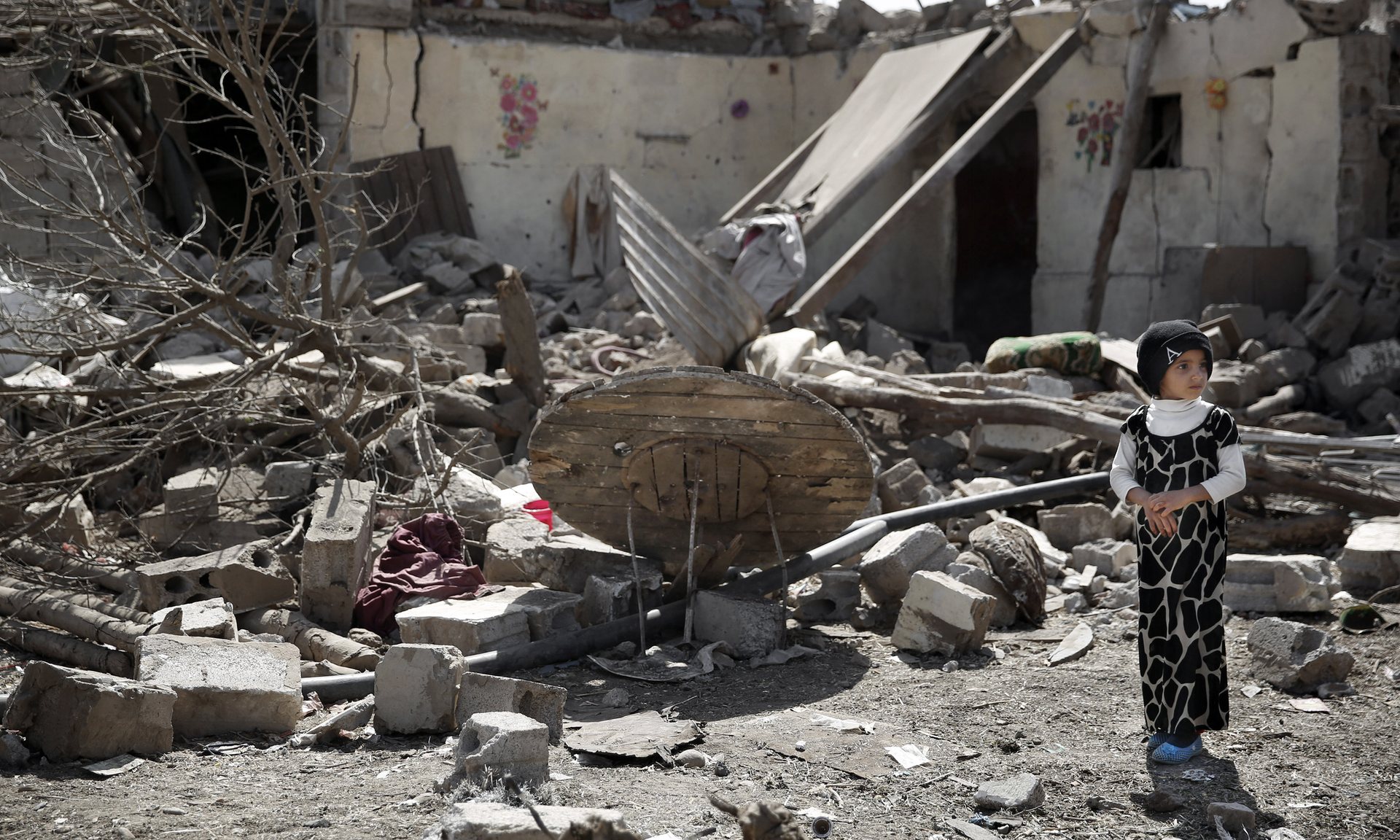European lawmakers voted overwhelmingly in favor of protecting Yemeni citizens. The UK and France are two of the biggest arms dealers to Saudi Arabia.

The remains of a house destroyed by a Saudi-led airstrike in Yemen’s capital on Thursday. Photograph: Hani Mohammed/AP
MEPs have voted for a European Union-wide arms embargo against Saudi Arabia to protest against the Gulf state’s heavy bombing campaign in Yemen.
The European parliament voted by a large majority for an EU-wide ban on arms sales to the kingdom, citing the “disastrous humanitarian situation” as a result of “Saudi-led military intervention in Yemen”.
The vote does not compel EU member states to act but it does increase pressure on Riyadh, in the wake of criticism from the UN and growing international alarm over civilian casualties in Yemen.
The resolution also turns up the heat on the British government, which has supplied export licences for up to £3bn worth of arms to Saudi Arabia in the last year. The UK has been accused of direct involvement in the bombing campaign through the deployment of UK military personnel to the kingdom.
Saudi Arabia began bombing in Yemen last March to support the Yemeni president, Abd-Rabbu Mansour Hadi, who was under threat from Houthi forces aligned with Iran.
Richard Howitt, the Labour MEP who drafted the key amendment, said: “This is a clear humanitarian appeal to end the bloodshed in Yemen, and call on Saudi Arabia to pursue a political rather than a military solution to the conflict.”
Howitt, who is Labour’s foreign affairs spokesman in Europe, also called on the British government to stop selling weapons to Riyadh. “The UK is one of the biggest suppliers of arms to Saudi Arabia and needs to heed this call, which has been overwhelmingly supported across the political spectrum and by a vast citizen campaign,” he said.
An earlier draft of the resolution that named and criticised the UK and other EU member states, including France, Spain and Germany, was dropped. The final version said “some EU member states” had continued to authorise transfers of weapons to Saudi Arabia since the violence started, in violation of EU rules on arms control.
The motion was passed by 359 votes to 212, as a diverse coalition of Socialists, Liberals, Greens, Leftists and Eurosceptics overcame opposition from the leadership of the two main centre-right groups, including Britain’s Conservatives. A separate resolution calling for a ceasefire in Yemen was supported by a larger number of MEPs.
Under a 2008 code of conduct, EU member states promised not to sell weapons to countries where they might be used “to commit serious violations of international humanitarian law” and undermine regional peace and stability.
The final resolution on arms control criticised the “intensification of airstrikes by the Saudi-led coalition”, despite a heavy lobbying campaign from the Gulf state in Brussels.
Howitt, who has had two meetings with Saudi government officials in recent weeks, said this campaign against the resolution showed its significance. “[The Saudis] don’t like it, they are calling it sanctions,” he said. “It is not sanctions, it is an obligation not to sell arms.”
The Saudi ambassador to Brussels, Abdulrahman al-Ahmed, has defended his country’s military intervention, saying that the kingdom had set up a “high-level independent committee” to “assess incidents” and develop “targeting mechanisms”.
In a letter to MEPs ahead of the vote, he said Houthi rebels being bombed by the Saudi-led coalition had bombed civilians, deployed child soldiers and used starvation as a weapon.
Since the start of the conflict about 7,000 people have been killed and more than 35,000 injured. Earlier this year a UN panel investigating the Saudi-led bombing campaign said it had found “widespread and systematic” attacks on civilian targets in violation of international humanitarian law.
Nearly 740,000 people have signed a petition calling for an arms embargo against Saudi Arabia, organised by the campaign group Avaaz.
Alex Wilks of Avaaz said: “For too long Europe has profited from massive arms sales to Riyadh even while the Saudi regime crushed democracy and human rights across the Middle East. Today the European parliament listened to the people and have for the first time stood firmly against Saudi impunity. Now it’s up to capitals to heed this leadership and stop turning a blind eye to massacres in Yemen.”
© 2016 Guardian News and Media Limited
 Print This Story
Print This Story
No comments:
Post a Comment